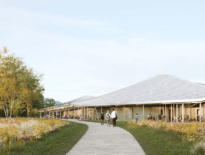
Congressional action could bolster the Bay State’s biomanufacturing industry by encouraging domestic drug production and prohibiting U.S. companies from doing business with some large Chinese drug contractors. iStock photo illustration
When we began compiling data for our annual “Industry Snapshot” report this summer, we knew last year was a challenging one for many in the biopharma industry. But we also knew we’d see signs of Massachusetts’ trademark resiliency in the data.
Sure enough, though industry layoffs got a lot of headlines in 2023, we still saw a net gain of 3,000 jobs.
But despite those promising indicators, critical questions remain. Are private biotechs getting the funding they need to keep the lights on and move their science forward? And how do we support our ecosystem to ensure Massachusetts remains a world-renowned leader?
The first half of 2024 showed promise, though venture capital funding ended up as one of the lowest six-month totals in years. Just two Massachusetts companies went public. And new lab space was coming online without tenants. What looked like positive momentum in January had seemingly stalled by mid-year.
Then came the summer, when you’d expect only fireworks to be lighting up the night sky. Big venture capital deals started piling up. As I’m writing this, third-quarter VC funding has already surpassed both the first- and second-quarter totals.
Two more Bay State biotechs have hit the NASDAQ. Federal employment data shows another net positive quarter for local biopharma jobs. And the Fed is about to cut rates.
Will Beacon Hill Approve $1B Investment?
But no summer is without a few storms. Gov. Maura Healey’s economic development package will need a special formal session to be passed, as that didn’t happen before the July 31 deadline. Included in that bill is the reauthorization of the state’s Life Sciences Initiative, first signed by Gov. Deval Patrick in 2008 and renewed by Gov. Charlie Baker in 2018.
As proposed by the governor and approved by the House of Representatives, this $1 billion investment would, over the next decade, drive the life sciences industry into new territory and address looming threats to the state’s national and global leadership. We are encouraged that the legislature is continuing to move bills to the governor’s desk, and public statements indicate that the jobs bill could also advance in what are normally sleepy weeks on Beacon Hill leading up to Election Day.
The biotech industry’s eyes are also on Washington, D.C., and not only because the next occupants of 1600 Pennsylvania Ave. will be chosen on Nov. 5. A piece of national security legislation that has recently passed the House of Representatives has our attention too.

Kendalle Burlin O’Connell
The BIOSECURE Act is a response to sincere concerns about Chinese access to patient data and an overreliance on China for drug development, but there are ramifications on research, development and manufacturing at many biotech and pharmaceutical companies that could be immediate and far-reaching. The bill would disrupt critical progress being made on treatments and cures, and challenge the United States’s leadership position in biomedical innovation.
Congress could also help to usher in a new wave of domestic biomanufacturing if it does BIOSECURE right – with flexibility and resources, as MassBio has continued to call for. Something on the scale of the CHIPS and Science Act of 2021 would achieve dual objectives.
With the prospect of a newly minted Life Sciences Initiative and an administration keen to chase down federal dollars, Massachusetts would be in a position to contribute to this manufacturing renaissance. We know companies want to use American contract research and manufacturing organizations. We also know that communities outside Route 495 are eager to host these facilities, and their residents are well-positioned to fill the jobs needed with some targeted skills training.
These are interesting and, in some ways, unprecedented times for the life sciences, but in an industry accustomed to many failures on the way to incredible wins for patients, we can always see opportunities in short-term setbacks. Homegrown biotechs continue to break new ground in labs across the Commonwealth in the newest and most promising modalities. With support from our state and federal partners, who’s to say their future drugs can’t be “Made in Massachusetts”?
Kendalle Burlin O’Connell is CEO and president of MassBio.






